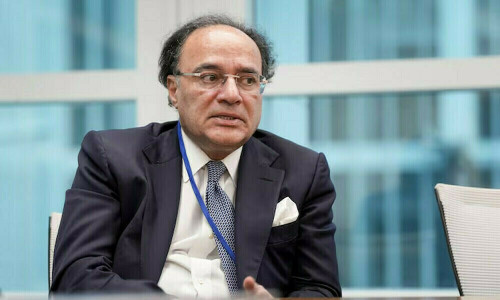Pakistan Prepared for Middle East Fallout, Assures Finance Minister
Amid escalating geopolitical tensions in the Middle East, Finance Minister Muhammad Aurangzeb affirmed on Tuesday that Pakistan is adequately prepared to handle any potential repercussions from the instability in the region.
Speaking at the “National Workshop on Transitioning to Defined Contribution Pension Schemes,” organized by the SECP in Islamabad, the finance minister stated that the government convened a comprehensive meeting on Monday with key stakeholders. The purpose was to “ensure sufficient reserves, a clear understanding of asset class pricing, and readiness for any potential scenario.”
“We are well-positioned regarding the actions required if the situation escalates further. I hope it does not,” the finance minister stated.
Recent actions by Israel and Iran have heightened concerns about a broader regional conflict that could significantly disrupt Middle Eastern oil exports. In response, Prime Minister Shehbaz Sharif formed a high-level committee on Monday to monitor petroleum product prices and supply dynamics in light of regional tensions.
Discussions on US Tariffs
Regarding ongoing discussions about US tariffs, Aurangzeb mentioned a “very productive and positive” meeting with Howard Lutnick, the United States Commerce Secretary, on Monday.
“Both nations are progressing in the right direction to ensure Pakistan’s competitive standing concerning US tariffs. More importantly, we are advancing the strategic partnership between Pakistan and the US,” he added.
In April, the previous US administration initiated a potentially damaging trade conflict by imposing extensive tariffs on imports globally, including additional levies on key trading partners like Pakistan.
Pakistan is working to secure relief from the 29% reciprocal tariffs previously imposed.
Commitment to Structural Reforms
Aurangzeb also reiterated the government’s commitment to maintaining structural reforms focused on energy, state-owned enterprises (SOEs), and taxation.
“We have implemented a fundamental reform concerning tariffs, aiming to transition the country towards a competitive economy by reducing protectionist measures to facilitate the advancement of our export industry,” he explained.
Aurangzeb noted that the government is reducing the cost of debt servicing. He also mentioned that pension payments have exceeded one trillion rupees, surpassing the federal government’s development budget.



Comments (0)
No comments yet. Be the first to comment!
Leave a Comment